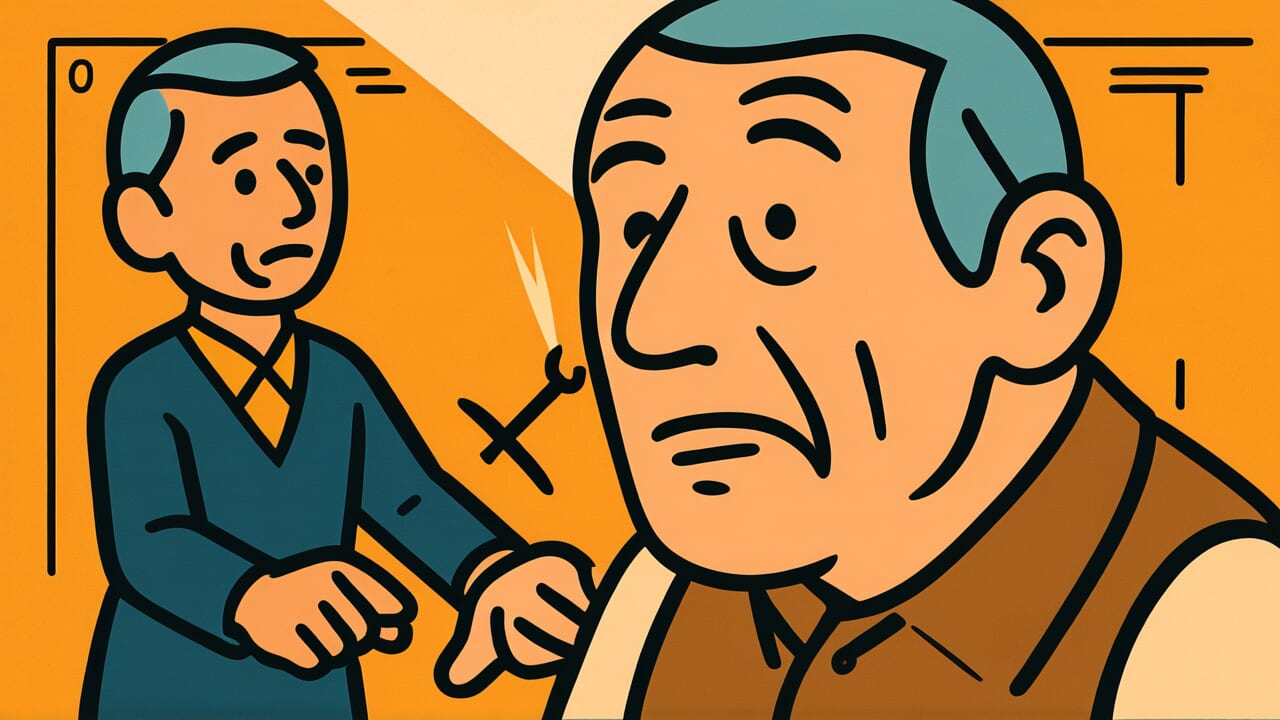How to Read “Old people and nail heads should stay withdrawn”
Toshiyori to kugigashira wa hikkomu ga yoshi
Meaning of “Old people and nail heads should stay withdrawn”
This proverb teaches that older people should stay humble and avoid pushing themselves forward.
As people age, they gain experience and knowledge. This often makes them want to share their thoughts and old stories with younger people.
However, being too pushy can make others uncomfortable. It can also prevent younger generations from growing. This proverb warns against such behavior.
Just as nail heads sticking out from wood get in the way, older people who push themselves forward too much disturb harmony.
Instead, they should step back and offer advice only when needed. This humble and modest attitude is considered a virtue for older people.
Even today, this spirit lives on when senior people at work or home make way for younger generations.
Origin and Etymology
No clear written records explain the origin of this proverb. However, the structure of the phrase offers interesting insights.
First, let’s look at the word “nail head.” This refers to the top part of a nail.
When nails stick out from wood surfaces, they catch on things and become dangerous. They also look ugly.
In traditional Japanese woodworking, craftsmen would set nail heads slightly below the wood surface. This made them invisible. Both practical use and beauty made this technique important.
The proverb compares this “better when withdrawn” quality of nails to how older people should behave.
During the Edo period, craftsman culture flourished. Carpentry skills were part of daily life. People regularly saw the beautiful finish of properly set nails.
In this everyday context, someone thought to compare ideal elderly behavior to nail heads. Not sticking out, staying modest, yet still fulfilling an important role.
The word “withdrawn” captures this attitude perfectly.
Usage Examples
- After retirement, I kept telling old stories at company alumni meetings. Then I remembered “Old people and nail heads should stay withdrawn” and decided to let younger people take charge.
- I want to comment on how my grandchildren are raised. But “Old people and nail heads should stay withdrawn” reminds me that grandparents should watch quietly.
Universal Wisdom
This proverb has been passed down because it understands a universal human trait. As people age, they increasingly want to prove their worth.
Years of experience are truly valuable. But at the same time, people feel anxious that their experience might become outdated.
This creates a strong desire to be recognized and to prove they’re still useful. This is a natural human emotion.
However, acting on this desire can damage relationships with others. The proverb sees through this contradiction in human psychology.
Truly respected elders don’t assert their value. They stay modest while maintaining a solid presence.
Looking deeper, this touches on the universal theme of generational change. In every era, older generations must make way for new ones.
But this isn’t easy. There’s sadness in letting go of what you’ve built. There’s anxiety about the younger generation. There’s fear of losing your place.
This proverb teaches the importance of facing these feelings. And still having the courage to step back.
When AI Hears This
Nails withdrawing and people becoming modest with age both follow the same universal law. That law is entropy increase.
Entropy measures disorder or randomness. Everything in the universe must increase its entropy over time.
Nail heads withdraw due to wood drying, expansion and contraction, and nail oxidation. The initial “sticking out” state is low entropy and orderly.
This order breaks down over time. The nail was in a high-energy state when first driven in. Through interaction with its environment, it moves to a more stable withdrawn state.
This irreversible change happens naturally without external force.
Human aging works the same way. The “protruding energy” of youth naturally transitions to a calmer state. Metabolism slows and cell division decreases.
This isn’t deterioration. It’s an inevitable shift to higher entropy. Withdrawing isn’t suppression. It’s a natural settling that follows physical laws.
The depth of this proverb lies in its perspective. It accepts aging not as forced pressure but as change following universal principles.
The wisdom here is not to resist but to flow with nature.
Lessons for Today
This proverb teaches you about the true nature of influence. Real influence doesn’t come from standing in front and asserting yourself.
It comes from supporting others from an appropriate distance.
In modern society, self-assertion through social media has become normal. But as you age, what matters isn’t quantity but quality.
Say the right words at the right time to the right people. Being modest yet reliable builds trust from those around you.
This wisdom shines especially when dealing with juniors at work or children at home. Watch their growth. Respect their right to fail.
Offer help only when asked. This attitude truly nurtures the next generation.
Your experience is valuable. But don’t force it on others. Wait quietly until they’re ready to receive it.
This patience and humility is the beauty of aging. Withdrawing doesn’t mean disappearing.
Rather, it means continuing to exist in a deeper way.



Comments